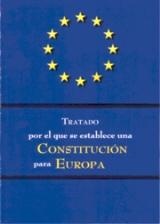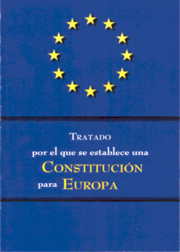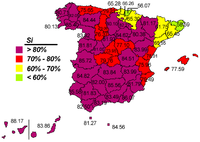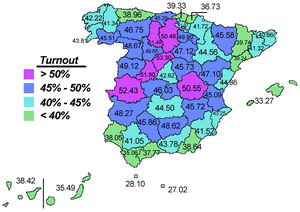
Spanish referendum on the European Constitution
Encyclopedia
The Spanish referendum on the Treaty establishing a Constitution for Europe is a consultative referendum
that was held on 20 February 2005 to decide whether Spain
should ratify
the proposed Constitution
of the European Union
.
The result was a landslide victory for the "Yes" campaign, with 77% of voters in favour. Turnout, however, was only 42% of the electorate—by far the lowest in any election since the restoration of democracy in the 1970s.
The question put to voters was:
The referendum was not legally binding on the government, but paved the way for parliamentary ratification of the constitutional treaty, which happened in the Congress of Deputies on 28 April 2005, with a result of 319 "Yes" against 19 "No", and in the Upper Chamber on 18 May 2005 with a result of 225 "Yes" against 6 "No" and one abstention.
 Both the governing Spanish Socialist Workers' Party
Both the governing Spanish Socialist Workers' Party
(PSOE) and the main opposition People's Party
(PP) campaigned for a "Yes" vote. They were joined by the Basque Nationalist Party
(EAJ–PNV) and the Catalan
nationalist
Convergence and Unity (CiU). Among the parties campaigning for a "No" vote were United Left
(IU), the Bloque Nacionalista Galego
(BNG, Galician National Block), Republican Left of Catalonia (ERC), Initiative for Catalonia Greens
(ICV), the social democratic
Aragonese Council
(CHA), the Basque nationalist
social democratic Eusko Alkartasuna
, and the Trade Union
s Confederación Intersindical Galega (CIG) and CGT
.
Amidst widespread apathy surrounding the constitutional treaty, and ignorance of its contents (in a government poll, 90 % of voters admitted to having little or no knowledge of its provisions), the government hired celebrities to read excerpts from the text in daily television
broadcasts, and five million copies (without annexes) were sent out with Sunday papers. While many felt that the result of the referendum was a foregone conclusion, it was feared that turnout could be as low as 40 to 50 % of the electorate. This turned out to be the case.
In late January 2005, several bodies campaigning for a "No" vote complained to Spain's independent National Electoral Commission about the government's planned information campaign:
In response to these complaints, the Commission ruled that the government's campaign must be purely informative, and banned several of its campaign slogans:
There were also reports of censorship
in the government's online forum on the Constitution. According to Another Democracy is Possible, the website also infringes Spanish law related to government information, and could be defined as "illicit publicity".

 The result of the referendum was a landslide victory for the "Yes" campaign. At only 42%, turnout was the lowest in any election since the restoration of democracy in 1977. This was seen by commentators as an embarrassment for the government of José Luis Rodríguez Zapatero
The result of the referendum was a landslide victory for the "Yes" campaign. At only 42%, turnout was the lowest in any election since the restoration of democracy in 1977. This was seen by commentators as an embarrassment for the government of José Luis Rodríguez Zapatero
.
Referendum
A referendum is a direct vote in which an entire electorate is asked to either accept or reject a particular proposal. This may result in the adoption of a new constitution, a constitutional amendment, a law, the recall of an elected official or simply a specific government policy. It is a form of...
that was held on 20 February 2005 to decide whether Spain
Spain
Spain , officially the Kingdom of Spain languages]] under the European Charter for Regional or Minority Languages. In each of these, Spain's official name is as follows:;;;;;;), is a country and member state of the European Union located in southwestern Europe on the Iberian Peninsula...
should ratify
Ratification
Ratification is a principal's approval of an act of its agent where the agent lacked authority to legally bind the principal. The term applies to private contract law, international treaties, and constitutionals in federations such as the United States and Canada.- Private law :In contract law, the...
the proposed Constitution
Treaty establishing a Constitution for Europe
The Treaty establishing a Constitution for Europe , , was an unratified international treaty intended to create a consolidated constitution for the European Union...
of the European Union
European Union
The European Union is an economic and political union of 27 independent member states which are located primarily in Europe. The EU traces its origins from the European Coal and Steel Community and the European Economic Community , formed by six countries in 1958...
.
The result was a landslide victory for the "Yes" campaign, with 77% of voters in favour. Turnout, however, was only 42% of the electorate—by far the lowest in any election since the restoration of democracy in the 1970s.
The question put to voters was:
¿Aprueba usted el Tratado por el que se establece una Constitución para Europa?Do you approve the Treaty establishing a Constitution for Europe?
The referendum was not legally binding on the government, but paved the way for parliamentary ratification of the constitutional treaty, which happened in the Congress of Deputies on 28 April 2005, with a result of 319 "Yes" against 19 "No", and in the Upper Chamber on 18 May 2005 with a result of 225 "Yes" against 6 "No" and one abstention.
Campaign

Spanish Socialist Workers' Party
The Spanish Socialist Workers' Party is a social-democratic political party in Spain. Its political position is Centre-left. The PSOE is the former ruling party of Spain, until beaten in the elections of November 2011 and the second oldest, exceeded only by the Partido Carlista, founded in...
(PSOE) and the main opposition People's Party
People's Party (Spain)
The People's Party is a conservative political party in Spain.The People's Party was a re-foundation in 1989 of the People's Alliance , a party led and founded by Manuel Fraga Iribarne, a former Minister of Tourism during Francisco Franco's dictatorship...
(PP) campaigned for a "Yes" vote. They were joined by the Basque Nationalist Party
Basque Nationalist Party
The Basque National Party is the largest and oldest Basque nationalist party. It is currently the largest political party in the Basque Autonomous Community also with a minor presence in Navarre and a marginal one in the French Basque Country...
(EAJ–PNV) and the Catalan
Catalonia
Catalonia is an autonomous community in northeastern Spain, with the official status of a "nationality" of Spain. Catalonia comprises four provinces: Barcelona, Girona, Lleida, and Tarragona. Its capital and largest city is Barcelona. Catalonia covers an area of 32,114 km² and has an...
nationalist
Nationalism
Nationalism is a political ideology that involves a strong identification of a group of individuals with a political entity defined in national terms, i.e. a nation. In the 'modernist' image of the nation, it is nationalism that creates national identity. There are various definitions for what...
Convergence and Unity (CiU). Among the parties campaigning for a "No" vote were United Left
United Left (Spain)
The United Left is a political coalition that was organized in 1986 bringing together several political organisations opposed to Spain joining NATO. It was formed by a number of groups of leftists, greens, left-wing socialists and republicans, but was dominated by the Communist Party of Spain...
(IU), the Bloque Nacionalista Galego
Bloque Nacionalista Galego
The Galician Nationalist Bloc is a Galician nationalist coalition of political parties. It is self-defined as a "patriotic front".Formed in 1982, under the guidance of historical leader Xosé Manuel Beiras, the BNG advocates for further devolution of powers to the Parliament of Galicia and the...
(BNG, Galician National Block), Republican Left of Catalonia (ERC), Initiative for Catalonia Greens
Initiative for Catalonia Greens
Initiative for Catalonia Greens is a political party in Catalonia, Spain. It was formed as a merger of Iniciativa per Catalunya and Els Verds. IC had been an alliance led by Partit Socialista Unificat de Catalunya and was the equivalent of Izquierda Unida in Catalonia...
(ICV), the social democratic
Social democracy
Social democracy is a political ideology of the center-left on the political spectrum. Social democracy is officially a form of evolutionary reformist socialism. It supports class collaboration as the course to achieve socialism...
Aragonese Council
Aragonese Council
The Chunta Aragonesista is a political party of Aragon , influenced by socialism, ecologism and pacifism. CHA defends a federal state, greater financial resources for Aragon, and the protection of the environment and hydrological resources of the Ebro Valley...
(CHA), the Basque nationalist
Basque nationalism
Basque nationalism is a political movement advocating for either further political autonomy or, chiefly, full independence of the Basque Country in the wider sense...
social democratic Eusko Alkartasuna
Eusko Alkartasuna
Eusko Alkartasuna is a Basque nationalist political party operating in Spain and France. The Basque language name means Basque Solidarity and abbreviated as EA. The party describes itself as a Basque nationalist, democratic, popular, progressive and non-denominational party...
, and the Trade Union
Trade union
A trade union, trades union or labor union is an organization of workers that have banded together to achieve common goals such as better working conditions. The trade union, through its leadership, bargains with the employer on behalf of union members and negotiates labour contracts with...
s Confederación Intersindical Galega (CIG) and CGT
Confederación General del Trabajo (Spain)
The General Confederation of Labour of Spain is an Anarcho-Syndicalist trade union, arisen from the 1979 split of CNT/AIT after the arrival of democracy and the following reorganization and restructuring process of the trade unions....
.
Amidst widespread apathy surrounding the constitutional treaty, and ignorance of its contents (in a government poll, 90 % of voters admitted to having little or no knowledge of its provisions), the government hired celebrities to read excerpts from the text in daily television
Television
Television is a telecommunication medium for transmitting and receiving moving images that can be monochrome or colored, with accompanying sound...
broadcasts, and five million copies (without annexes) were sent out with Sunday papers. While many felt that the result of the referendum was a foregone conclusion, it was feared that turnout could be as low as 40 to 50 % of the electorate. This turned out to be the case.
In late January 2005, several bodies campaigning for a "No" vote complained to Spain's independent National Electoral Commission about the government's planned information campaign:
- On 14 January, ERC demanded that the National Electoral Commission should block what it saw as unfair promotion of the treaty by the government.
- On 19 January, the Tomás Moro Centre for Juridical Studies (CJSTM) and Another Democracy is PossibleAnother Democracy is PossibleAnother Democracy is Possible was a Spanish activist group , claiming for more democracy ....
complained to the National Electoral Commission about what they saw as the unfair nature of the government’s campaign.
In response to these complaints, the Commission ruled that the government's campaign must be purely informative, and banned several of its campaign slogans:
The campaign to be carried out by the Government as part of the present referendum process must inform objectively on the contents of the Treaty… All value judgements and slogans previously used in TV, on websites and other media, e.g. 'We are first with Europe', and statements that could, direct or indirectly, influence the position or attitude of the citizens, must be removed.
There were also reports of censorship
Censorship
thumb|[[Book burning]] following the [[1973 Chilean coup d'état|1973 coup]] that installed the [[Military government of Chile |Pinochet regime]] in Chile...
in the government's online forum on the Constitution. According to Another Democracy is Possible, the website also infringes Spanish law related to government information, and could be defined as "illicit publicity".
Results


José Luis Rodríguez Zapatero
José Luis Rodríguez Zapatero is a member of the Spanish Socialist Workers' Party . He was elected for two terms as Prime Minister of Spain, in the 2004 and 2008 general elections. On 2 April 2011 he announced he will not stand for re-election in 2012...
.
| Final results: | ||
| Votes cast | 14,204,663 | 42.32% |
| Abstentions | 19,359,017 | 57.68% |
| Electorate | 33,563,680 | |
| Of votes cast: | ||
| Valid votes | 14,081,966 | 99.14% |
| Invalid votes | 122,697 | 0.86% |
| Total votes | 14,204,663 | |
| Of valid votes: | ||
| Yes | 10,804,464 | 76.73% |
| No | 2,428,409 | 17.24% |
| Blank | 849,093 | 6.03% |
| Total | 14,081,966 | |
External links
- Election results (in Spanish)
- Government's European Constitution site (in Spanish)
- Government's online forum (in Spanish)
- The monitoring report (1,2 MB pdf 18 p.) evaluates the fairness of the process in Spain using internationally recognized standards (p.4 250 KB pdf 20p.) for a referendum. More info: in English, in Spanish
- News coverage:
- BBC: Spain's hard sell to win EU Yes
- BBC: Madrid voters differ over charter
- BBC: Spain voters approve EU charter
- CNN: Spain voters back EU constitution
- BBC: Spain's mixed EU signals
- BBC: Spain gives uncertain lead to EU
- EUbusiness: Zapatero calls for stronger Europe as Spaniards kick off EU votes
- EUbusiness: Spain says resounding yes to European constitution
- Financial Times: Lessons from Spain's rushed poll

